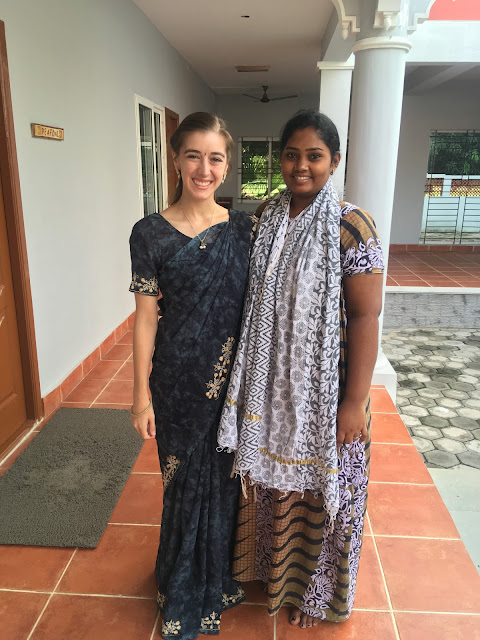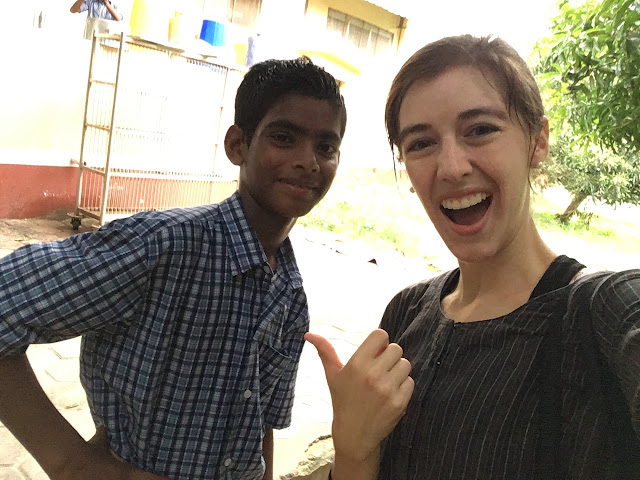When the Deaf and Dumb Help the Blind
Gray clouds filled the sky and teased us with occasional drops of rain. Despite the unpredictable weather, we remained calm about our work in Polambakkam. I was stationed in the middle of a row with buckets and chairs. At one end, patients would have their old bandages removed from the ulcers on their feet; at the other end, they would receive fresh bandages. I was the "middle man." This was only fitting though, as I am the middle child in my family. I often find myself sandwiched between two ends. So what was my job? Washing. I would first carefully count and examine the ulcers on a given patients feet. Once I knew the needs of the patient, I would wash their feet (and sometimes up their lower legs)in a bucket of medicated water to cleanse the open wounds they had incurred. All of the feet I saw were scarred and discolored-- not a single one bearing all of their toes. Some feet had no remaining evidence of ever having toes! After washing their feet, I would dry the ulcers and the surrounding areas thoroughly yet gingerly. At first I worried about the pain I might be causing them, but quickly remembered that they would feel no pain. They were numb to everything I did. They couldn't, and wouldn't, feel the pain of the ulcers... all because of leprosy.
One of my patients was an adorable old man who is deaf and dumb. His toes and feet had rotted significantly and his fingers were curled in such a manner that it seemed that it would be difficult for him to perform average daily tasks. Despite all this, he smiled. His eyes were lit up, and his open-mouth grin filled his face as he would laugh and create sounds to go along with his hands motions. For a time we communicated with our hands and our eyes. I admit I don't know what all of his hand and arm gestures meant, but we both knew that we were communicating messages of love and friendship with a deep desire to connect. Once I finished working with him, he went on to receive treatment from others on the medical team; and after that, he left.
I hadn't seen the last of him though.
After finishing up with a few other patients, I looked down the main concrete path of the colony to find two figures approaching from the distance. As I watched, I noticed that one of them had a walker, and both figures were traveling at a considerably slow pace. As they drew closer, I realized that the other figure was my friend that I had just connected with through hand motions and smiles. I decided to go greet him and his acquaintance. When I reached them I noticed that my friend was carefully assisting the other man to move with his walker. I walked with them the remainder of the way to the washing and bandaging station. As the man was receiving help I ended up speaking with the colony leader, who happened to speak English.
"That was so sweet of him to help his friend over here," I said, reflecting on the patience that the mute and deaf man had for his friend.
"Yes. Here, the deaf and the dumb receive help and then they return to help the blind." the colony leader replied.
"Wait, his friend is blind??" I asked, feeling slightly embarrassed that I hadn't noticed before.
"Yes."
This struck me. Perhaps it didn't need to make that big of a difference to me, but this new information changed the circumstance for me. The action seemed more significant... more impactful. It was suddenly more poetic. My heart was warmed even more. Here, the deaf and the dumb... help the blind... his words kept ringing in my ears. Not only do these people suffer from the effects of leprosy, but some of them carry other signifiant disabilities... and it doesn't stop them. It doesn't stop them from seeking help and seeking progression-- but more importantly, it doesn't stop them from being charitable.
There I was, doing my best to give what I can and have charity like my Savior... yet I left the Polambakkam colony having witnessed perhaps the most Christlike action I may ever see in my life. I hope to always have that image in my memory.




Comments
Post a Comment